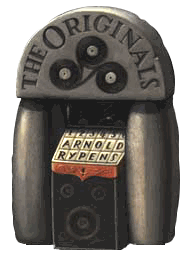AMAZING GRACE
Created on 13/11/2004Latest update on 05/02/2025
Artist: Sacred Harp Choir
Author: trad./John Newton
Label: Brunswick
Year: 1922
As New Britain; Amazing grace were the first words of this hymn, written by John Newton, once a slave trader but he changed his mind completely. He became pastor in Olney (UK) and published these lyrics as part of The Olney Hymns (1779). First linked with its familiar melody (New Britain) in 1835, published by William Walker in the famous Southern Harmony And Musical Companion hymn book (1835). Four years earlier that same New Britain tune was published in shape-note book The Virginian Harmony entitled Harmony Grove (with different words). The first time Amazing Grace was published as coupled with the New Britain tune was in 1900 in hymnal Make His Praise Glorious by Edwin Othello Excell, who added an extra stanza (When we've been there ten thousand years...) lifted from Harriet Beecher Stowe's novel Uncle Tom's Cabin (1852).
Covers:
- 1926:
Wisdom Sisters [the first as Amazing Grace, for Columbia]
- 1926:
Rev. H.R. Tomlin [idem]
- 1926:
Rev. J.M. Gates [for Victor, Paramount and Black Patti]
- 1928:
- 1938:
- 1939:
Jesse Allison [with Vera Hall and Dock Reed; John A. Lomax recording]
- 1940:
Blind Willie McTell [recorded by John A. Lomax]
- 1940:
Lead Belly [for the Library of Congress]
- 1942:
- 1946:
- 1947:
- 1950s:
Five Blind Boys Of Alabama [in 2001 to the melody of The House Of The Rising Sun]
- 1951:
- 1952:
- 1953:
- 1955:
Jesse Fuller [instrumental blues version]
- 1959:
Howard Adams & The Congregation of the Thornton Old Regular Baptist Church [as if nothing changed since the founding fathers]
- 1960:
- 1962:
- 1963:
Soul Stirrers [lead vocal: Jimmie Outler]
- 1963:
- 1966:
Big Brother & The Holding Company [in medley with Hi Heel Sneakers; vocal: Janis Joplin]
- 1966:
- 1967:
- 1970:
Johnny Cash [in film I Walk The Line with Gregory Peck and in '74 on LP Sings Precious Memories]
- 1970:
Judy Collins [spending over a year in the UK charts]
- 1970:
Byrds [outtake Untitled lp]
- 1970:
- 1971:
- 1971:
Mieke Telkamp [with Hi Five as Waarheen, Waarvoor, inspired by the Judy Collins arrangement; lyrics: Karel Hille]
- 1971:
Rod Stewart [in medley with That's All Right]
- 1972:
Pipes And Drums And Military Band Of The Royal Scots Dragoon Guards [n°1 UK for 5 weeks, top 20 US; formed in 1678, they are even older than this hymn]
- 1972:
Aretha Franklin [title track LP]
- 1972:
- 1973:
- 1973:
Vicky Leandros [as Auf wiederseh'n, ihr Freunde mein]
- 1973:
- 1974:
- 1975:
Van Dyke Parks [outtake from his LP Clang Of The Yankee Reaper]
- 1975:
- 1975:
Amazing Rhythm Aces [in Amazing Grace Used To Be Her Favorite Song; top 10 C&W]
- 1976:
- 1976:
- 1976:
- 1976:
Lena Valaitis [as Ein Schöner Tag]
- 1977:
Yes [Chris Squire solo]
- 1977:
Yvette Horner [as Au revoir]
- 1988:
Ladysmith Black Mambazo [with Paul Simon]
- 1989:
Daniel Lanois [on Acadie; vocal: Aaron Neville]
- 1989:
- 1992:
- 1993:
Annie de Rooy [alias Paul De Leeuw as Waarheen, Waarvoor]
- 1993:
- 1993:
- 1994:
Allen Ginsberg [as New Stanzas For Amazing Grace; written for Ed Sanders]
- 1995:
- 1996:
- 1997:
- 1997:
- 1997:
- 1997:
Dana Winner [as Waarheen Waarvoor]
- 1997:
- 1998:
All Saints [elements in Never Ever]
- 1999:
- 2000:
- 2002:
- 2002:
- 2002:
- 2002:
- 2003:
Willy Sommers, Lisa del Bo & Luc Steeno [as Vier Woorden]
- 2004:
- 2004:
- 2005:
- 2006:
- 2008:
- 2009:
- 2009:
- 2011:
Stef Ekkel [als Waarheen Waarvoor]
- 2014:
Gerard Joling & Gordon [as Waarheen, Waarvoor]
- 2014:
Paul Simon [as New Stanzas For Amazing Grace, on tribute The Life And Times Of Allen Ginsberg]
- 2021:
- 2021:
Preachers used simple hymns to get their message across on illiterate congregations. Singing helps to memorize content, especially when it's been pounded in, line by line, over and over again, and that's what it's all about with shape-note hymns.


